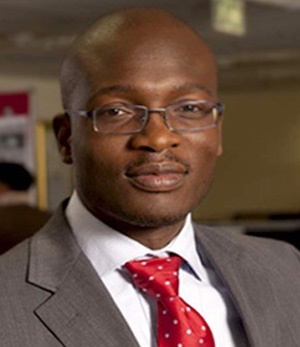
Mpumelelo Mkhabela
The proposed free higher education for the poor, effective from 2018, is mechanical and focuses narrowly on the financial needs of the impoverished. But it lacks the moral necessity to produce graduates who would have a sense of obligation to society.
Under pressure from a wave of seemingly unstoppable student protests, lame duck president Jacob Zuma took the decision to provide free higher education to all poor students. The decision was endorsed by the ANC's 54th national conference, intensifying the debates about whether South Africa can afford it.
Government officials are crunching the numbers. Universities are anxious to see how the government will finance the scheme given the fact that they are already underfunded. The country is waiting to see which service delivery or infrastructure budgets will be cut to finance the rollout of free higher education.
It is interesting that the idea of free higher education for students who come from households with gross income of R300 000 excludes all forms of repayment. The beneficiaries would owe society nothing, even if they fail or drop out. It's really totally free. Free from interest payment. Free from social obligations.
It's purely a mechanical project being designed to assist poor students to gain access to training opportunities in preparation for entry into the labour market or becoming entrepreneurs. The design excludes an important dimension: the character of the prospective graduate.
At this stage, the prospective graduate is treated purely as mechanical being who needs financial assistance for the fulfilment of a mechanical objective of entering the economy as an employee or entrepreneur. Technical and monetary needs of the prospective graduate have been elevated above values that should underpin civic duty.
The noble goal of ensuring as many as possible are skilled is achievable. Only the unrealistic would deny the need to assist poor students gain an education. But it appears the noble motive to provide free higher education has triumphed the idea of creating a society driven by values of responsibility.
While the essence of free education is driven by the government's perspective of its responsibility to those who cannot make ends meet, it is being designed in such a way that it also undermines this very same value by not inducting the beneficiaries to the value of reciprocity towards society. This means the government is using social solidarity as a foundational value to achieve a purely liberal, individualistic outcome – a Margaret Thatcher-type of human being.
It's wrong to treat poor students in this way. Of course, they won't complain. Who would complain about being given a priceless lifetime gift such as access to higher education? The risk, though, is that the beneficiaries will soon be converted into statistics for government achievements.
Every year we will be told how many students have been supported by the government through the free higher education scheme. Absent of the values of responsibility towards society, the statistics will not tell us the extent to which the students are responsible citizens.
This is not to say poor students must be treated differently simply because they receive free higher education from society. But the danger of not imposing on them an obligation to society could impoverish the value of social solidarity from which they derive benefits.
Consider a student from a privileged background whose parents decided not give her free cash for fees, but instead stood as guarantor for a secure a loan which must be paid when she starts working. It is more likely that this student would emerge a better graduate with a better appreciation for the assistance she received than someone who has no obligation to pay anything in return.
It is true that students from poor backgrounds are already faced with obligation to look after extended family members and therefore cannot be compared to those who are privileged. They also pay so-called "black tax" – the remittances of black middles class to extended family members. But repayment for assistance received in the form of free higher education doesn't have to be in cash. It could be by way of a properly administered nationwide community service programme.
Many wealthy parents who have businesses ensure that their children work in those businesses during school holidays and after they have graduated, in order to earn some pocket money. In the absence of this kind of privilege in families of working class students, the government could play the role of wealthy parents in this context.
A combination of community service and an obligation to be a good citizen, such as for example, not being involved in crime, including the destruction of university property, could be included in the package of social responsibility for recipients of free higher education. After all, crime such as the burning of libraries and laboratories on many campuses is often committed in the name of poor students. The point is, there must be something that ties them to society. It's not a given that they would appreciate free higher education.
The government must demonstrate that it has learned from the experience of social grants. It dawned late on the government that there were people who received social grants and failed to enrol their children in school.
The fact that there are no-fee schools and free meals has not motivated some parents and guardians to ensure that all children who receive social grants attend school. Nor has it motivated them to take an interest in the educational activities of the beneficiaries of social grants.
It took time for the government to consider linking social grants to the obligation of parents or guardians to take their children to school. Even after this idea was considered, it is not being implemented or enforced. There is no sound mechanism in place to enforce it. As a result, there are recipients of social grants who don't go to school or who drop out inexplicably.
This means poverty will continue to be reproduced and the measure of success for government's anti-poverty programmes would continue to be the consistently rising number of people on social grants.
In the case of no-obligation free higher education, we face the danger of producing students who have no sense of giving back. The forthcoming stakeholder meeting aimed at finalising the free higher education plan must include some form of non-monetary obligation to society. Or face the prospects of manufacturing technically skilled graduates without souls.
- Mkhabela is a fellow at the Centre for the Study of Governance Innovation (GovInn) at the University of Pretoria.
Disclaimer: News24 encourages freedom of speech and the expression of diverse views. The views of columnists published on News24 are therefore their own and do not necessarily represent the views of News24.




 Publications
Publications
 Partners
Partners






















